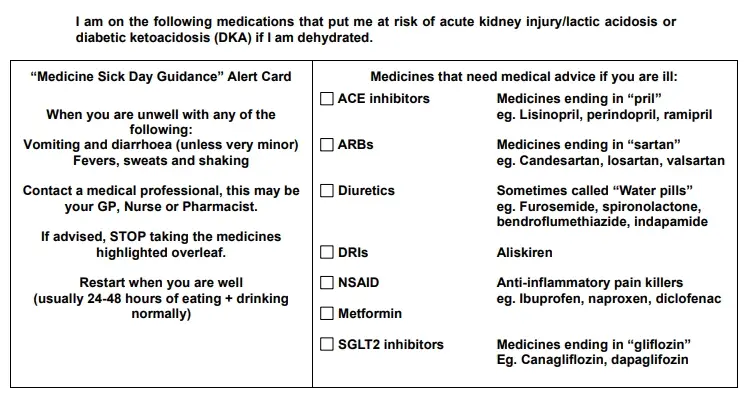We use cookies to help provide you with the best possible online experience.
By using this site, you agree that we may store and access cookies on your device. Cookie policy.
Cookie settings.
Functional Cookies
Functional Cookies are enabled by default at all times so that we can save your preferences for cookie settings and ensure site works and delivers best experience.
3rd Party Cookies
This website uses Google Analytics to collect anonymous information such as the number of visitors to the site, and the most popular pages.
Keeping this cookie enabled helps us to improve our website.
Sodium-glucose Co-transporter 2 (SGLT2) Inhibitors
This information is important for patients prescribed a SGLT2 inhibitor. If you are prescribed one of the following medications, you are taking a SGLT-2 inhibitor:
- Dapagliflozin
- Canagliflozin
- Empagliflozin
- Ertugliflozin
You should take this medication according to the instructions from your prescriber. Please make sure you understand how to take the medicine and ask if you have any questions.
This is an effective treatment for several conditions, diabetes, heart failure or chronic kidney disease. As with all medications, it can have some side effects. These can include:
- Hypoglycaemia (low blood glucose) – This usually only occurs if taken in combination with other diabetes medicines and your prescriber may therefore need to alter the dose.
- Dehydration – This medicine increases your urine volume so may cause dehydration. To prevent dehydration, you must drink at least two litres of non-sugary drinks a day, unless directed otherwise.
- Genital infections – As this medicine increases the glucose (sugar) in your urine, there is an increased risk of infection, such as genital thrush. Wash your genital area with warm water using non-perfumed soap and avoid wearing tight underwear to reduce the risk of infection.
In rare cases, SGLT2 Inhibitors can cause more serious side effects or complications, including diabetic ketoacidosis (DKA), Fournier’s gangrene and lower-limb amputation. Please seek medical advice immediately if you have any of the following:
- Rapid weight loss
- Feeling or being sick, or stomach pain
- Fast and deep breathing
- Sweet or metallic taste in the mouth
- Different odour to your breath, urine or sweat.
- Severe pain, tenderness, redness, or swelling in the genital area, accompanied by fever or feeling unwell.
If you are taking canagliflozin, or are diabetic, it is important you attend for regular foot checks whilst taking this medication.
If you become unwell and have vomiting, diarrhoea, or fever, you should stop this medication. You can restart when you are better (eating and drinking normally), however if you remain unwell after 48 hours seek medical advice from your GP, Pharmacist or NHS 111.
The following blood tests are required to monitor your treatment, at least once a year. If you haven’t had one in the last year, please book a blood test with your GP practice.
| Blood Test HbA1c | Reason for test To monitor diabetes (if prescribed for diabetes) |
| Blood Test eGFR | Reason for test To check how your kidneys are working |
| Blood Test Creatinine | Reason for test To check how your kidneys are working |
Medicines and Dehydration “Medicine Sick Day Guidance"
You can become dehydrated from vomiting, diarrhoea or fever (high temperature, sweats, shaking). If you are sick or have diarrhoea once, then you are unlikely to become dehydrated. Having two or more episodes of vomiting or diarrhoea or having a prolonged fever can lead to dehydration. Taking certain medicines when you are dehydrated can result in you developing a more serious illness.
Medicines that make dehydration more likely are:
- Diuretics - Sometimes called “water pills” eg Furosemide, spironolactone, bendroflumethiazide
Medicines that can stop your kidneys working if you are dehydrated are:
- ACE inhibitors - Medicine names ending in “pril” eg Lisinopril, perindopril, ramipril
- ARBs - Medicine names ending in “sartan” eg Losartan, candesartan, valsartan
- DRIs - Medicine working on the kidneys eg Aliskiren
- NSAIDs - Anti-inflammatory pain killers eg Ibuprofen, diclofenac, naproxen
Medicines that make you more likely to have a side effect called lactic acidosis if dehydrated are:
- Metformin - A medicine for diabetes
Medicines that make you more likely to have a side effect called diabetic ketoacidosis (DKA) if dehydrated are:
- SGLT2’s -Medicine names ending in “gliflozin” eg Canaglifozin, Dapagliflozin, Empagliflozin
Wallet Card
We have produced a wallet card that you can place in your wallet.
If you need a printed version of this, please contact or come into reception

